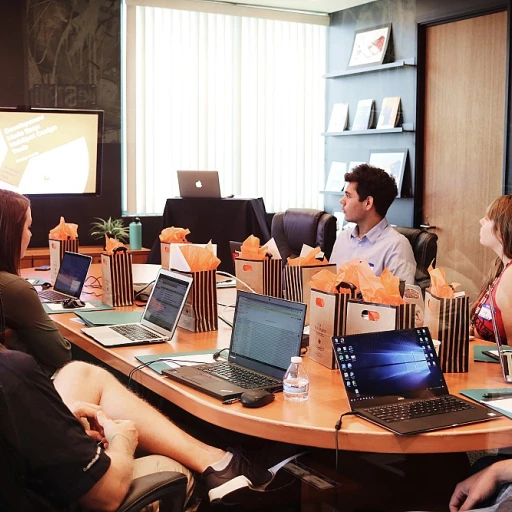
Understanding deia training and its relevance
What is DEIA and Why Does It Matter?
DEIA stands for Diversity, Equity, Inclusion, and Accessibility. In the context of the Arabian Emirate business environment, DEIA training is more than a compliance requirement. It is a strategic investment in people and company culture. DEIA training programs help office managers and leadership teams understand the value of a diverse workforce, identify unconscious bias, and create an inclusive workplace where all employees feel a sense of belonging.
The Relevance of DEIA in Modern Workplaces
Global business trends and federal initiatives are increasingly focused on diversity, equity, and inclusion. For office managers, this means adapting to new expectations and ensuring that DEIA efforts are not just theoretical, but practical and measurable. A strong DEIA program can improve team building, foster inclusive excellence, and support employees with disabilities or unique backgrounds. It also helps companies attract and retain top talent by creating a workplace culture that values every individual.
- DEIA initiatives address both visible and invisible differences among employees
- Effective DEIA training reduces bias and supports inclusion accessibility
- Diversity training programs can improve employee engagement and productivity
Connecting DEIA to Leadership and Decision-Making
Office managers play a critical role in shaping how DEIA is implemented. Their leadership influences how employees experience inclusion and how company culture evolves. Understanding how decision-making works in a hierarchical organization can help managers integrate DEIA principles into daily business operations. For more insights, explore this resource on decision-making in hierarchical organizations.
As the workplace becomes more diverse, office managers must stay informed about best practices in DEIA training and adapt their strategies to meet the needs of their teams. This foundation sets the stage for recognizing cultural nuances, overcoming challenges, and building a sustainable culture of inclusion.
Recognizing cultural nuances in the workplace
Appreciating Diversity in the Arabian Emirate Workplace
In the Arabian Emirate business environment, understanding cultural nuances is essential for office managers aiming to foster a truly inclusive workplace. The region is home to a diverse workforce, with employees from various nationalities, backgrounds, and abilities. This diversity brings unique perspectives, but also requires sensitivity to different traditions, communication styles, and expectations.
Effective deia training goes beyond basic awareness. It helps leadership and teams recognize how cultural values shape work habits, collaboration, and even conflict resolution. For example, some employees may prefer direct communication, while others value a more indirect approach. Recognizing these differences can help managers create a sense of belonging and support inclusive excellence.
- Language and Communication: With many employees speaking different native languages, clear communication is vital. Training programs should address language barriers and promote respectful dialogue.
- Religious and Cultural Practices: Respecting prayer times, holidays, and dietary restrictions demonstrates commitment to diversity and inclusion. This also extends to accommodating employees with disabilities and ensuring inclusion accessibility.
- Unconscious Bias: DEI training can help teams identify and address unconscious bias, which may affect hiring, promotions, and daily interactions.
By recognizing and valuing these cultural nuances, office managers can create an environment where all employees feel respected and included. This not only enhances company culture but also supports business goals by improving employee engagement and team building. For practical guidance on monitoring workplace processes and supporting diverse teams, explore efficiently monitoring the design process with ticketing systems.
Ultimately, understanding and embracing cultural diversity is a cornerstone of effective deia efforts, laying the groundwork for successful deia initiatives and sustainable inclusion dei programs.
Key challenges faced by office managers
Common Obstacles in Fostering Inclusive Excellence
Office managers in Arabian Emirate companies play a crucial role in shaping a workplace culture that values diversity, equity, inclusion, and accessibility (deia). However, implementing effective deia training and programs comes with its own set of challenges. Understanding these obstacles is essential for creating a truly inclusive environment where all employees feel valued and empowered.
- Unconscious Bias: Despite good intentions, unconscious bias can influence decision-making, team building, and leadership. This can affect hiring, promotions, and daily interactions, making it harder to achieve inclusive excellence.
- Cultural Sensitivities: The Arabian Emirate workplace is diverse, with employees from various backgrounds and cultures. Recognizing and respecting these cultural nuances is vital, but it can be challenging to balance different perspectives while maintaining company culture.
- Resistance to Change: Some employees or leadership may be hesitant to embrace new deia initiatives or training programs. This resistance can slow down progress and impact the effectiveness of diversity and inclusion efforts.
- Accessibility and Inclusion for Employees with Disabilities: Ensuring inclusion accessibility for employees with disabilities requires ongoing commitment and resources. Overlooking this aspect can hinder the sense of belonging and limit the impact of deia efforts.
- Measuring Impact: It can be difficult to track the effectiveness of deia training and programs. Without clear metrics, it’s challenging to demonstrate progress or identify areas for improvement.
To address these challenges, office managers need to create a supportive environment where open communication is encouraged and all employees have opportunities to contribute. Leveraging federal guidelines and best practices can help align deia initiatives with business goals. For example, adopting flexible policies, such as unlimited PTO policies, can support work-life balance and reinforce a culture of trust and inclusion.
By acknowledging these challenges and actively working to overcome them, office managers can help create a workplace where diversity, equity, and inclusion are not just ideals, but everyday realities for every team member.
Practical strategies for effective deia training
Implementing Actionable Steps for Inclusive Excellence
For office managers in Arabian Emirate companies, translating deia training into practical actions is essential for fostering a truly inclusive workplace. Effective deia initiatives go beyond compliance, aiming to create a culture where every employee feels valued and empowered. Here are some practical strategies to help office managers lead the way in diversity, equity, and inclusion (dei) efforts:
- Customize training programs: Adapt deia training to reflect the diverse backgrounds and cultural nuances of your team. This ensures relevance and increases engagement among employees.
- Address unconscious bias: Incorporate regular sessions on recognizing and reducing unconscious bias. Encourage open discussions and provide real-world examples to make the learning experience relatable.
- Promote inclusive leadership: Equip leaders and supervisors with tools to model inclusive behaviors. Leadership buy-in is crucial for embedding diversity and inclusion into the company culture.
- Encourage employee participation: Involve employees in shaping deia initiatives. Gather feedback through surveys or focus groups to understand their needs and perspectives.
- Enhance accessibility: Ensure that training materials and workplace resources are accessible to all, including employees with disabilities. This demonstrates a commitment to inclusion accessibility and equity inclusion.
- Integrate team building: Organize team building activities that celebrate diversity and foster a sense of belonging. These activities can break down barriers and strengthen relationships within diverse teams.
- Establish clear goals and accountability: Set measurable objectives for deia efforts and regularly review progress. Hold leadership and teams accountable for advancing diversity inclusion and inclusive excellence.
By focusing on these strategies, office managers can create a supportive environment where employees feel respected and included. Effective deia training is not a one-time event but an ongoing process that shapes the workplace culture and drives business success. When employees see a genuine commitment to diversity, equity, and inclusion, it enhances team morale and helps build a sustainable sense of belonging across the organization.
Measuring the impact of deia training
Tracking Progress and Outcomes
Measuring the impact of DEIA training is essential for office managers aiming to create a more inclusive and effective workplace culture. Without clear metrics, it is difficult to understand whether diversity, equity, inclusion, and accessibility initiatives are truly making a difference for employees and the business.
- Employee Feedback: Regular surveys and open feedback sessions help gauge how employees feel about inclusion, accessibility, and the overall company culture. This feedback highlights areas where DEIA training programs are succeeding or need improvement.
- Participation Rates: Monitoring attendance and engagement in DEIA training sessions and related programs provides insight into employee interest and leadership support. High participation often signals a strong commitment to diversity and inclusion.
- Behavioral Changes: Observing shifts in team dynamics, communication, and collaboration can indicate the effectiveness of DEIA efforts. Look for increased team building, reduced incidents of bias, and a greater sense of belonging among employees, including those with disabilities.
- Business Outcomes: Track key performance indicators such as employee retention, productivity, and innovation. A more inclusive workplace often leads to improved business results and a stronger reputation for inclusive excellence.
- Policy and Practice Updates: Review how often workplace policies and practices are updated to reflect DEIA principles. Consistent updates show ongoing commitment to equity and inclusion.
For office managers in the Arabian Emirates, it is important to tailor measurement tools to the unique cultural context of their teams. Combining quantitative data with qualitative insights ensures a holistic view of DEIA initiatives. Ultimately, effective DEIA training should help create a workplace where all employees feel valued, respected, and empowered to contribute to the company’s success.
Building a sustainable culture of inclusion
Embedding Inclusion into Everyday Business Practices
Creating a sustainable culture of inclusion requires more than one-off deia training programs. For office managers in Arabian Emirate companies, it means weaving diversity, equity, and inclusion into the fabric of daily business operations. This approach ensures that deia efforts are not just initiatives, but part of the company culture and leadership mindset.
- Continuous Learning: Encourage ongoing dei training and diversity training sessions. These can address unconscious bias, promote inclusive excellence, and help employees feel valued.
- Inclusive Policies: Review and update workplace policies to support inclusion accessibility and equity inclusion. Make sure employees with disabilities and those from diverse backgrounds have equal opportunities.
- Leadership Commitment: Leadership should model inclusive behaviors and support deia initiatives. When leaders prioritize diversity inclusion, it sets a standard for the entire team.
- Open Communication: Foster an environment where employees can share feedback about deia programs. This helps identify gaps and ensures that inclusion dei remains relevant to the team’s needs.
- Team Building: Organize team building activities that celebrate diversity and create a sense of belonging. These activities can help break down barriers and build trust among employees.
Maintaining Momentum for Inclusive Excellence
To keep deia efforts effective, office managers should regularly measure the impact of training and adjust strategies as needed. Recognize and celebrate progress, whether through employee recognition programs or sharing success stories. This ongoing commitment helps employees see that diversity equity and inclusion are core values, not just compliance requirements.
By embedding deia into business practices and maintaining a focus on inclusive excellence, companies can create a workplace where all employees feel respected and empowered to contribute. This not only benefits the team but also strengthens the company’s reputation and success in a competitive market.













